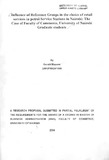| dc.description.abstract | Retail service stations in recent years have been experiencing challenging times.
Some of the challenges include, increasing crude oil prices, higher pump prices,
emergence of new independent players in the market, and an increase in the number
of retail service stations. Against that background this study sought to determine how
reference groups influence the purchase decisions of consumers of petroleum based
retail service stations. The specific objectives of the study were to determine the
extent to which reference groups influence the choice of petroleum based retail
stations and the type of reference group influences (either informative, normative or
comparative) on consumer's choice of petroleum based retail station for service
The study was a descriptive survey that used primary data, collected by use of a
questionnaire. The Masters in Business Administration graduate students at the
University of Nairobi as at 9th July 2004 comprising 1009 students was taken as the
population from which a sample of 200 was selected using convenient sampling
The study revealed that reference groups determine the choice of petroleum based
retail stations to a moderate extent, with females relying heavily on husbands for
advice on choice, while males rely to a moderate extent on mechanics. The decision
on whether to use convenience services is not based on informative influence however
one cannot conclude that informative influence does not determine choice of fuel and
non fuel servicing because respondents are evenly divided on this issue. Purchase
decision of fuel, non-fuel and convenience services is not influenced by comparative
reference group influence. Normative influence emanating from family members
only, was found to be the most effective in decision making on the choice of retail
service stations when it comes to fuel and non fuel related services.
Limitations of this study were that it focused on a highly educated group of
respondents drawn from Nairobi only. It was recommended that retail service stations
formulate marketing strategies that target the most influential groups such as
husbands, males, experienced drivers, and mechanics. It also recommended to better
understand consumer susceptibility to interpersonal influence. | en |

